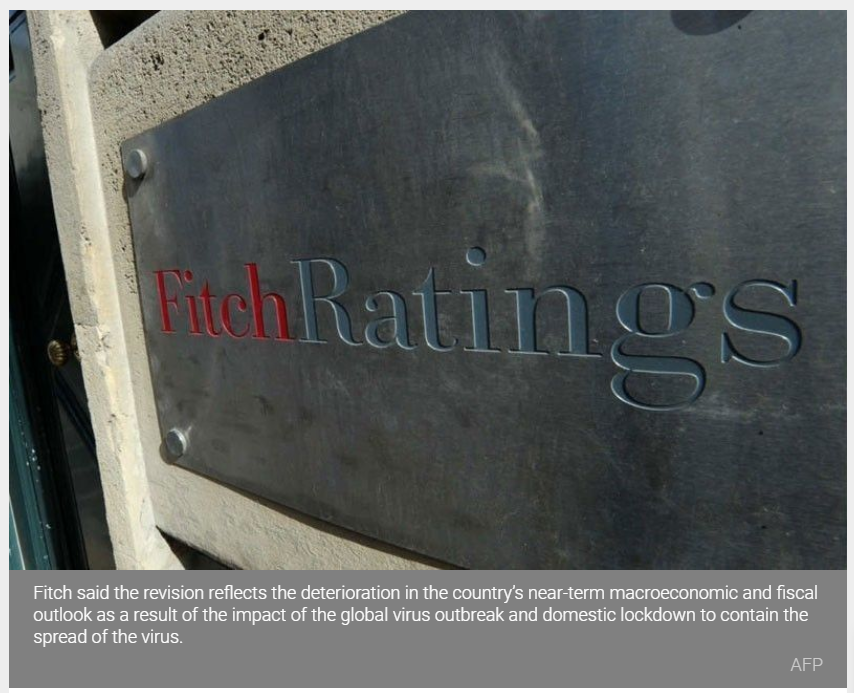Fitch downgrades Philippines credit rating
First time in 15 years
MANILA, Philippines — The Philippines suffered a setback as it received its first credit rating downgrade in 15 years after New York- based Fitch Ratings lowered the country’s credit outlook to stable from positive due to the economic fallout from the coronavirus disease 2019 or COVID-19 pandemic.
Fitch said the revision reflects the deterioration in the country’s near-term macroeconomic and fiscal outlook as a result of the impact of the global virus outbreak and domestic lockdown to contain the spread of the virus.
This is the first downgrade received by the Philippines since July 2005 when the major credit rating agencies – Fitch, S&P Global Ratings and Moody’s Investors Service – revised the country’s credit outlook to negative from stable as plans to oust then president Gloria Macapagal Arroyo mounted.
Since the downgrade in July 2005, the Philippines received 25 favorable actions from the debt watchers, bringing the country’s credit rating to BBB+ or just a single notch below the much coveted A-scale in April last year for S&P as well as to BBB for Fitch and Baa2 for Moody’s, both two notches above minimum investment grade, from junk status in 2005.
Fitch raised the country’s credit rating outlook to positive from stable just last February, meaning a rating upgrade is possible in 12 to 18 months, on the back of sound macroeconomic fundamentals.
However with the global health crisis, Fitch now projects the country’s gross domestic product (GDP) to contract by one percent this year, the first time since 1998 when the domestic output shrank by 0.5 percent at the height of the Asian financial crisis, after expanding by six percent last year.
“The 2020 forecast is uncertain and subject to considerable downside risks depending on how the virus runs its course globally and domestically and the possibility of a further extension or re-imposition of lockdown measures,” it added.
Malacañang imposed a Luzon-wide enhanced community quarantine last March 16 to prevent further spread of the dreaded disease. The lockdown has been extended to April 30 and then to May 15, particularly in Metro Manila and nearby provinces.
Fitch noted that fiscal relief measures being adopted by the government would translate to a higher budget deficit than the approved ceiling of 3.5 percent of GDP for 2020, while the general government-to-GDP ratio would rise to 46 percent by 2021 before easing to 41.7 percent by 2023.
The debt watcher, however, affirmed the country’s BBB rating or a notch above minimum investment grade, reflecting the Philippines’ fiscal and external buffers, including its lower government debt-to-GDP ratio compared with peer medians and net external creditor position, as well as its still-strong medium-term growth prospects.
Bangko Sentral ng Pilipinas Governor Benjamin Diokno said the country entered the once-in-a-lifetime health crisis in a strong position.
“Structural reforms and sound economic management over the years have provided us with monetary and fiscal space to safeguard lives and support livelihoods at this critical time,” Diokno said.
The central bank’s Monetary Board has taken prompt and decisive actions including the reduction of interest rates by 125 basis points and lowering the reserve requirement ratio by 200 basis points, freeing up P200 billion to boost market confidence and soften the blow of the coronavirus pandemic.
Diokno assured that the BSP stands ready to use its full range of policy tools to help address the impact of the coronavirus pandemic on the domestic economy.
Finance Secretary Carlos Dominguez said the Philippines is in a good fiscal position to deal with the unprecedented challenges posed by the contagion that has brought the global economy to the cusp of a recession.
Dominguez added the government is capable of meeting the huge financial requirements of its COVID-19 response because of the prudent macroeconomic and fiscal management policies set in place by President Duterte since he assumed office in 2016.
“These policies plus comprehensive tax reforms have resulted in a well-balanced debt management strategy and improved revenue streams that now allow the Duterte administration to fund massive healthcare and livelihood support to save Filipino lives and protect our communities without fear of a debt blowout,” Dominguez said.
The chief of the Department of Finance (DOF) said the government is working with the Congress, the business community, and the rest of the private sector to lead the country to the path of a quick post-pandemic recovery and sustained high–and inclusive—growth.
Authorities said earlier the efforts to achieve the much coveted A credit rating from debt watchers has taken a backseat as the government focuses on softening the blow of the virus pandemic.
“The economy and the macroeconomic fundamentals are sound but unfortunately, we, just like the rest of the world are suffering. So the road to A might take a backseat at the moment,” Diokno said.
Securing an A rating provides significant benefits such as lower borrowing costs for both the government and private entities.
“So achieving an A rating by 2022 may or may not happen. The BSP and the national government will remain focused on pursuing appropriate policies and the necessary structural reforms to put the economy back on its high growth trajectory and create more jobs to improve the lives of our people,” Diokno said.
Source: https://www.philstar.com/business/2020/05/09/2012696/fitch-downgrades-philippines-credit-rating


 English
English




